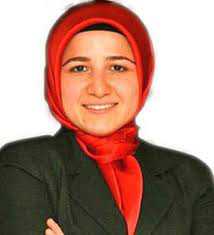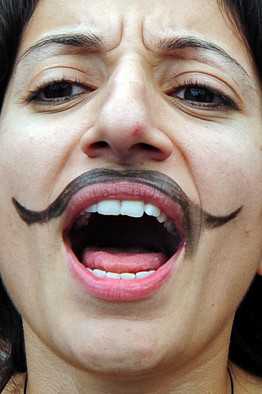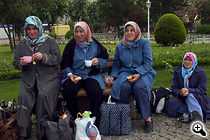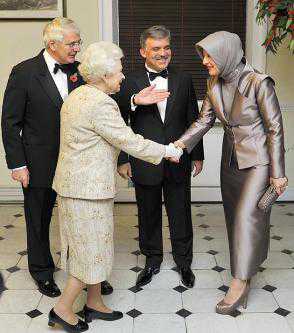By Justin Vela
ISTANBUL – During the now infamous Mavi Marmara crisis between Turkey and Israel last summer, a board member of the Insani Yardim Vakfi (IHH), the Turkish aid organization that sponsored the Free Gaza flotilla, was asked about the ruling Justice and Development Party (AKP).
Connections between the IHH, Turkey’s first and largest humanitarian organization, and the AKP were clear. Members of the AKP had even been planning to travel on the flotilla to Gaza, but canceled at the last minute. Yet the board member said, “Look, I do not vote for the AKP.” He was less clear about which political party he did support.
Given the degree of the IHH’s religious conservativeness, it was likely that most members of the organization cast their vote for
the Saadet Partisi (the Felicity Party), one of Turkey’s few still functioning Islamic political parties that received votes in local and national elections, though never enough to pass the 10% threshold to enter parliament
Though the country’s opposition has accused them of possessing a secret, long-term plan to establish an Islamic state in Turkey, the AKP is officially a secular political party. In mass media they are usually described as “Islamic-rooted” or coming from an “Islamic background” or another variation of this vague categorization.
Over the course of the AKP’s eight years in government, the power of the secular military and judiciary has decreased, the constitution has been reformed, and democracy has grown, all of which are in line with the demands of Turkey’s European Union accession process.
While a recent European Commission report blasts declining press freedoms, the EU has lauded Turkey’s progress in revamping the economy and raising its level of democracy even as religion appears to be increasingly at the forefront. In many ways, this might be expected. Turkey is a 99% Muslim country. Yet it is experiencing an increased polarization between the secular and religious, a trend that will most likely increase in the lead-up to June 2011 parliamentary elections.
This polarization is dangerous for a variety of reasons. On the one hand religion’s more obvious role in society proves an increased democratization in a country whose degree of devoutness has perhaps been underestimated. The secularists are also experiencing a shift from being the traditional power-holders to now seeing the more religious lower classes suddenly possessing more influence.
On the back of a surprisingly strong victory in September’s referendum on controversial constitutional amendments, the AKP has brought the long-running headscarf issue to the forefront of the political discourse. This is likely the first attempt at invigorating voters before next year’s election.
The headscarf is an issue Turkey is long overdue to settle and even main opposition leader Kemal Kilicdaroglu, of the Republican People’s Party, or CHP, is signaling that a change to the laws surrounding the headscarf, which is currently banned in public institutions, including universities, must take place. This is despite the military boycotting this year’s National Day celebrations at Cankaya Palace in Ankara where First Lady Hayrunnisa Gul attended wearing a headscarf, a act that is technically illegal due to the headscarf being banned in public institutions.
Since the founding of the modern Turkish republic in 1923, there has perhaps not been another time when Islam in Turkey has gone through such transformations, both in matters of presentation and style, and also importance. The AKP has supported traditionally practicing Muslims economically and politically more so than any previous government and has also changed and modernized what it means to be Islamic in Turkey.
Yet the AKP does not enjoy the support of the openly Islamic Saadet Party and many more conservative Muslims in Turkey. There is indeed a deep rift between the groups, with members of Saadet believing the AKP to have been co-opted by Western powers, becoming a pawn of a global imperialism extending from these countries. The AKP’s neo-liberal trade policies are, also, condemned by Saadet as Turkey maintains high unemployment and uneven wealth distribution.
The current head of Saadet, Necmettin Erbakan, recently lashed out at Prime Minister Recep Tayyip Erdogan and President Abdullah Gul in an August 2010 interview with the German newspaper Die Welt. “Some foreign powers brought them into their current position. Zionist, imperialist and racist powers in the current world order. They are supporting a Western, Zionist world order unintentionally. Most of what they have done is wrong. They are making the Zionists richer with taxes and debts. Erdogan became the cashier of Zionism. He was my student before. Yet now, our aim is to knock him over.”
Erbakan served as Turkey’s prime minister in a coalition government from 1995-1997, before being forced to step down by the military in what is called by some a “post-modern coup”. He was also vice prime minister between 1974-1978, in coalition with various right-wing secular parties, an especially strange twist to the practical steps often taken by those who desire power. Called the “hoca”, a term for a religious leader that is also sometimes used in Turkey to refer to university teachers, Erbakan had been a mentor to Erdogan and Gul when the two were members of his Refah Partisis (the Welfare Party) and Fazilet Partisis (the Virtue Party), which were banned in 1997 and 2001, respectively.
Fazilet and Refah followed Erbakan’s numerous previous parties such as the Milli Selamet Partisi (The National Salvation Party) and Milli Nizam Partisi (National Order Party), and were closed by the judiciary for violating the secular principals of Turkey’s constitution. Erdogan and Gul, seeing that there was no way they could hold national power without becoming more moderate, founded the AKP in 2001. Erbakan was banned from politics in 1997 following the closure of Refah, but had his supporters founded Saadet, which continued to serve as the party of traditionally conservative Muslims.
Due to the majority of their voters deciding to support the AKP, Saadet was never very popular. In 2009 local elections, the party polled only 5.16%. In 2007 national elections, they won 2.34% of votes. Saadet’s primary strength actually is likely to lay outside of Turkey, among Turks living abroad in Europe. For them, Saadet is the current leader of the “Milli Gorus” (National Vision) movement, which seeks to re-establish Islam as a leading force in Turkey and reportedly has 300,000 members throughout Europe.
Like the shadowy Gulen movement, Milli Gorus, which takes its name from a manifesto Erbakan wrote in 1969, is a vast social network providing services and community as well as a political force. Not as powerful as the Gulen movement however, which is said to have pull within the Turkish government, to control the police force, and posses Islamic-turanistic tendencies, Milli Gorus is focused more on strengthening traditional Islam within Turkey.
They also profess a desire to end Turkey’s alliance with Western countries, despite Erbakan, during his times in power, failing to significantly change any of Turkey’s core policies. Many of Turkey’s connections with the EU and trade policies were even strengthened during his time in power yet he maintained an anti-Western stance, especially when out of office.
At 84 and needing assistance to walk, Erbakan was elected the head of Saadet in October 2010. The party was run since its inception by his close supporters until an April 2009 court decision allowed Erbakan to again directly participate in politics. Maintaining that the AKP is the product of a Western-Zionist conspiracy that aims to take over Turkey, Erbakan recently told the Turkish paper Taraf that “imperialism is doing new studies to polish AKP” for the 2011 elections.
Although many members of his party welcomed Erbakan’s return, what appeared to be the establishment of a family dynasty within Saadet caused a new split. In October, Erbakan’s son, Fatih, daughter, Elif, and son-in law, Mehmet Altinoz, were elected to Saadet’s administration in a party congress that saw huge posters of Erbakan and Mustapha Kemal Attaturk, the republic’s founding father, together in the same hall.
The move to establish a more prominent role for his family within Saadet was not taken kindly by Erbakan’s former confidant and the previous Saadet head, Numan Kurtulmus, who split off from Saadet and on November 1 founded the Voice of the People Party (HAS), the 67th political party in Turkey.
HAS is expected to hold its first congress on November 28, where elections will be held to form its administrative bodies. Difficult to categorize, HAS united a number of politicians from different backgrounds. There are members of past Islamic political parties, as well as Kurtulmus’ supporters from Saadet. With him there are also people from leftist parties and right of center parties.
Turkish United Workers’ Party leader Zeki Kilicaslan said that he joined HAS because “when Kurtulmus was introducing the HAS party to me, he said it would be a party that is against imperialism, neo-liberal policies and brutal exploitation policies. He also said the party would be the people’s party and not be based on religion or conservatism.”
At least one commentator has said that HAS was positioning itself to stand somewhere between AKP and Saadet in ideology and seeking to appeal mostly to the victimized segment of Turkish society. As it includes some members of parties that voted “yes” to the constitutional amendments in September’s referendum, but did not support the AKP itself, HAS could provide an alternative during future elections. It also could become a possible coalition partner for the AKP should the scattered opposition organize itself enough to win a sizable amount of votes in a future election.
All this is likely only to come after the AKP forms a single-party government following the parliamentary elections in June 2011. Then there will be the decidingly telling time during the writing of the new constitution. The AKP’s increasingly authoritarian bent will be exposed for what it is or isn’t. Following September’s referendum, Erdogan professed a desire to be inclusive during the writing of a new constitution. Yet what inclusive means in a Turkey that is more confident, perhaps even over-confident, in its importance on the global stage, is yet to be seen.
Justin Vela is a freelance journalist based in Istanbul, Turkey.
(Copyright 2010 Asia Times Online (Holdings) Ltd. All rights reserved. Please contact us about sales, syndication and republishing.)
 Published on: Friday 20 May 2011, 14:55 by Fréderike Geerdink in Hoofdartikel, Politics, Religion, Stories, Women
Published on: Friday 20 May 2011, 14:55 by Fréderike Geerdink in Hoofdartikel, Politics, Religion, Stories, Women




